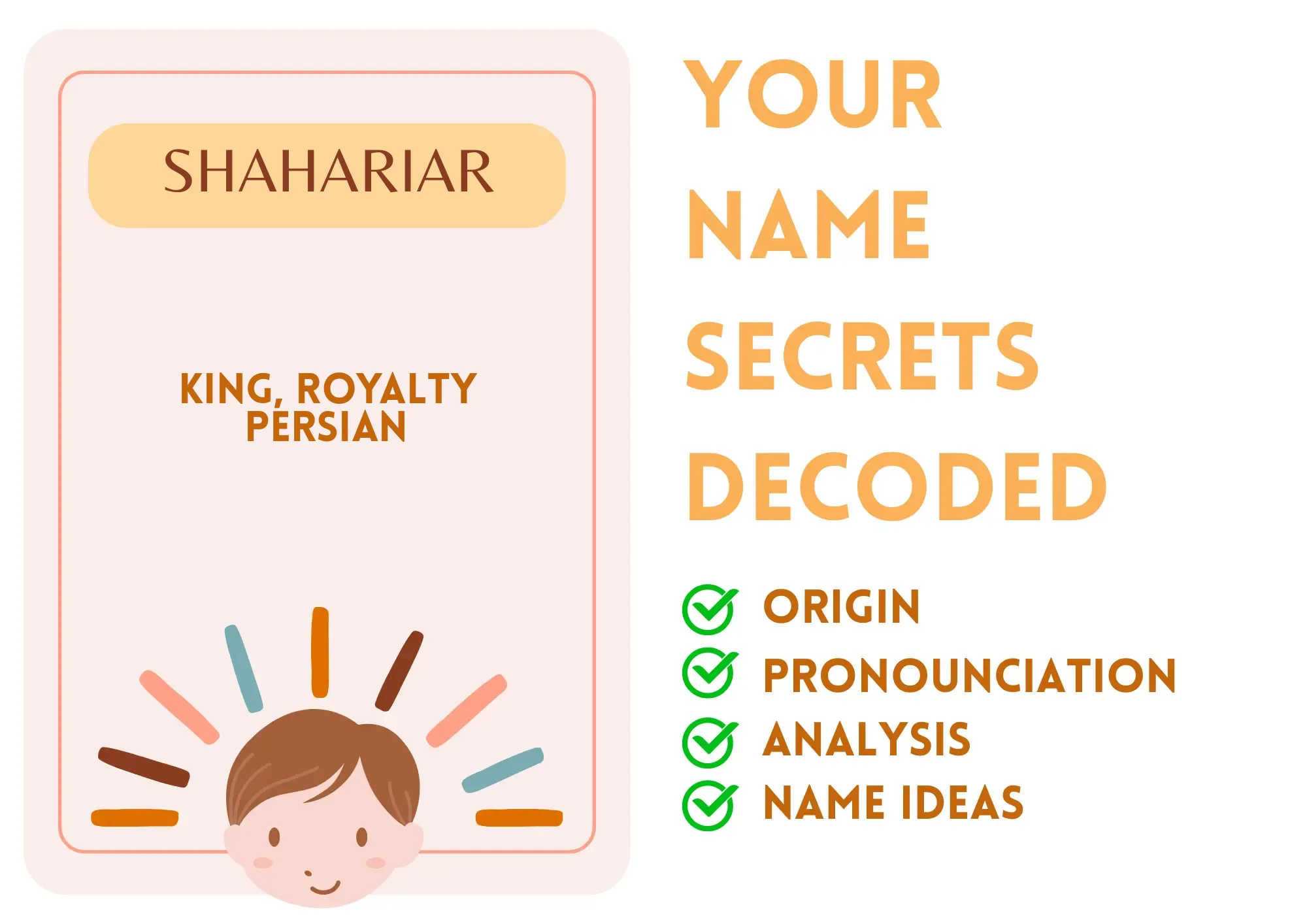
Shahariar
Shahariar is a name steeped in cultural significance, most notably connected to Persian origins. The name translates roughly to 'king' or 'royalty,' embodying power and leadership. It has roots in Middle Eastern cultures and is often associated with nobility and strength. Used primarily for males, Shahariar carries a certain regality that makes it appealing in different cultures.
This name has a strong historical significance linked to tales from 'One Thousand and One Nights,' where Shahriyar is featured as a king who faces personal challenges and transformation. The name evokes a sense of grandeur, leadership, and honor.
Shahariar is perceived positively, suggesting a regal demeanor and noble characteristics. Its length and complexity may offer challenges in writing and pronunciation, but it is still considered a majestic name for a boy.
Basic Information
Gender: Boy
Sounds Like: sha-hah-ree-ahr
Pronunciation Explanation: Emphasis is placed evenly across all syllables, with a soft 'sha' followed by 'hah', 'ree', and ending with 'ahr'.
Summary and Meaning
Meaning: king, royalty (Persian)
Origin: The name Shahariar has Persian origins, often connected to royal or noble lineages.
Usage: Shahariar is traditionally a male name, associated with leadership and strength.
Name Number (Chaldean)
Name Number (Pythagorean)
Popularity (Global Rank)
Overall: 34205
Boys: 45944
Most Popular in
Religious and Cultural Significance
Religion: Islam
Background: Shahariar is often encountered within Islamic culture, particularly due to its ties to Persian literature that is rich in Islamic history and values.
Cultural Significance: In Persian culture, the name embodies authority and respect, often celebrated in literature and stories that highlight kingship and justice.
Historical Significance: Shahariar features prominently in 'One Thousand and One Nights,' a famous collection of Middle Eastern folklore, symbolizing the challenges of love, betrayal, and redemption.
Popular Culture
Literature and Mythology: The character King Shahriyar in 'One Thousand and One Nights' is pivotal, representing themes of justice and the complexities of human emotion.
Movies and Television: Various adaptations of the tales have depicted Shahariar, presenting him as a complex character dealing with themes of love and power in film and television.
Feelings and Perceptions
Perception: Shahariar is generally viewed positively, however, its complexity and length may create a sense of intimidation among some. It resonates with those who appreciate deep cultural roots and historical significance.
Positive Feelings: Regal, strong, traditional, honorable, and deep.
Negative Feelings: Complex, potentially difficult to pronounce, and less common in contemporary naming.
Practical Considerations
Ease of Writing and Calling: Shahariar is more challenging to write and pronounce than simpler names, consisting of multiple syllables and letters, which may also lead to variations or mispronunciations.
Common Typos and Misspellings: Shahriar,Shahariarh,Shaharear,Shohariar
Common Nicknames: Shah,Hari,Riar
Shahariar Popularity
Shahariar Usage and Popularity By Country
| Country | Rank (Overall) |
|---|---|
| Bangladesh | 452 |
| Poland | 16125 |
| Iran | 20736 |
| Norway | 27537 |
| Sweden | 31840 |
| Australia | 36837 |
| Malaysia | 55545 |
| United Kingdom | 57184 |
| Thailand | 60600 |
| United States | 72145 |
Shahariar Usage and Popularity By City
| City | Rank (Overall) |
|---|---|
| New York | 27841 |
| Dhaka | 958 |
| London | 35343 |
| Rajshahi | 259 |
| Washington | 24818 |
| Rangpur | 126 |
| Auburn | 2736 |
| Toronto | 27251 |
| Melbourne | 23253 |
| Milwaukee | 6671 |
Compatibility Analysis
Famous Persons Named Shahariar
No results found for Shahariar.
Related Names
Similar Sounding Names:
Shahrukh,Shahbaz,Shafik
Similar Meaning and Related Names:
Sibling Name Ideas (Brothers):
Rami 
Islam, Judaism
